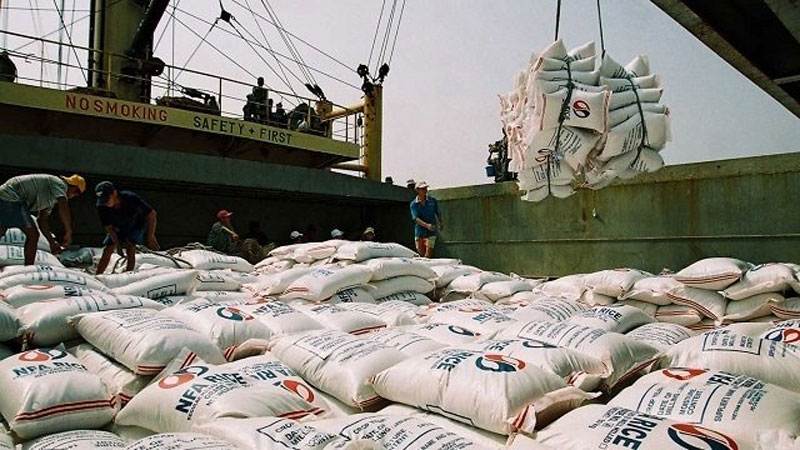
According to the Ministry of Agriculture and Rural Development, in the first quarter of 2019, Vietnam's rice export volume was estimated at 1.43 million tonnes, worth US$ 593 million, down 3.5% in volume and 20.2% in value over the same period in 2018.

Illustrative
image.
The average
export price of rice in the first two months of the year only reached US$404
per tonne, down 17.8% compared to the same period in 2018. Difficulties in
exporting rice in the first quarter have dragged down the price of rice in the
Mekong Delta, especially in February, 2019, when entering the harvest of
winter-spring rice.
Part of the reason for the decline in the volume
of exported rice is due to the fact that the first few months of the year
coincide with the Lunar New Year, plus domestic enterprises have not promoted
delivery and traders who buy rice have not begun to trade yet. On the market
side, in the early months of 2019, some countries still have surplus rice from
2018, so they have no demand for import which in turn makes the market less
active.
In addition, China, one of Vietnam's major rice
import markets for many years, has now reduced their rice purchases, which has
had a relatively large impact. At the same time, measures to closely control
food safety and hygiene for imported rice have been strengthened and there are
more stringent regulations on the supervision and management of imported goods.
Until now, only 21 Vietnamese enterprises are allowed to export rice to the
Chinese market. The reduction of export indications has led to a sharp decline
in rice export volume.
For other traditional markets such as the
Philippines and Indonesia, Vietnam is also facing difficulties in boosting rice
exports to these markets. Specifically, the Philippines is seeking to expand
its rice supply by signing more memorandums of cooperation with Pakistan and
Myanmar. Meanwhile, Indonesia has also restricted imports because the country's
reserved rice is still sufficient until the end of the second quarter of 2019.
Facing the above situation, it is necessary to
strengthen solutions to maintain traditional markets and penetrate new markets.
Specially, it is necessary to pay attention to exporting high quality rice and
specialty rice instead of white rice as before.
In addition, localities need to accelerate the
effective implementation of the restructuring scheme of the rice industry,
because the competition for rice quality is becoming a real "war"
when the rice of some other countries in the region are constantly increasing
competition for Vietnamese rice in terms of quality, value and ways of
promoting their image. Therefore, in addition to improving quality,
strengthening the promotion of rice trade in markets, and the promotion and
image building for Vietnamese rice also are very important, therefore businesses
and authorities should pay greater attention to these requirements. After
building an image of high quality rice seeds with competitive prices, the
export to fastidious markets will certainly become more open, creating new
markets to stabilise the volume and turnover value.
Source: NDO
Hoa Binh province’s economy posted an impressive Gross Regional Domestic Product (GRDP) growth rate of 12.67% in the first quarter of 2025, representing a 12.76% year-on-year increase, the highest rate recorded since the beginning of the current tenure, according to the provincial Statistics Office. This robust growth reflects years of strategic groundwork and sets a strong foundation for the province’s annual growth target of over 10%.
With a focus on cash crop farming with science - technology application and brand building, Lac Thuy district is gradually increasing production value, improving people's life quality, and laying the foundation for sustainable socio-economic development.
In recent years, the economic development model "Hoa Binh Earthworm Farm” run by Mr. Bui Van Dang in Co Giua Hamlet, My Thanh Commune (Lac Son district) has not only brought stable economic value but it is also environmentally friendly, helping to protect and reduce pollution, contributing to the construction of a green and sustainable agriculture.
Dao Village’s honey – a product certified with a 3-star OCOP (One Commune One Product) rating by Thong Nhat Agricultural Cooperative in Dao Village (Hoa Binh City) – is highly regarded by consumers for its quality, richness, and variety in packaging. The distinctively sweet taste of Dao Village’s honey leaves a lasting impression on anyone who has tried it.
In alignment with Project No. 07-DA/TU, issued by the Hoa Binh provincial Party Committee on November 1, 2021, Lac Thuy district has actively promoted investment and supported the sustainable development of its industrial and handicraft sectors during the 2021–2025 period. Alongside this, the district has remained committed to preserving and revitalising traditional craft villages.
Located in the northern part of Lac Thuy district, with a temperate climate and fertile soil, Phu Thanh commune has great potential and advantages in growing tea. The long-standing experience, combined with strict adherence to organic farming practices in the tea gardens, ensures that the dried tea products from Phu Thanh and Lac Thuy as a whole are sold out immediately upon production, providing a stable and prosperous life for the local people.



